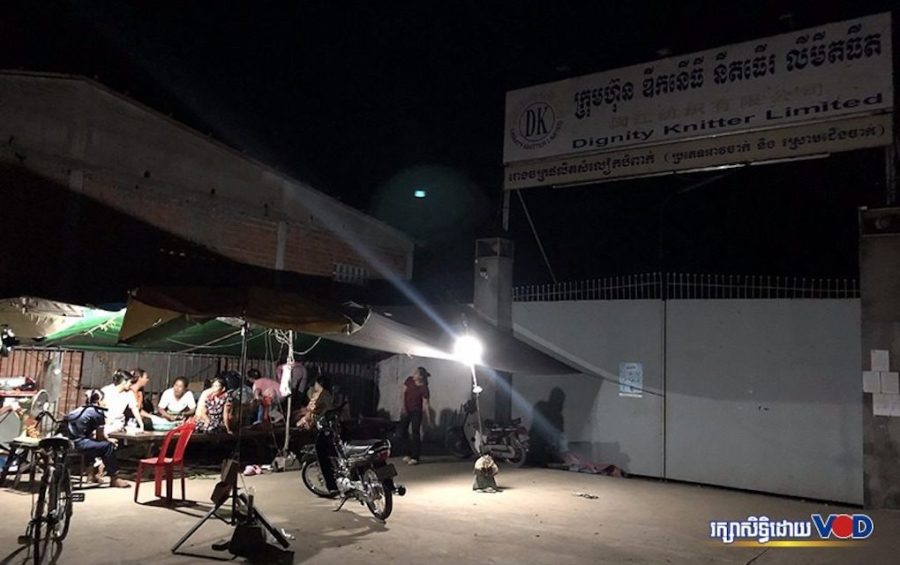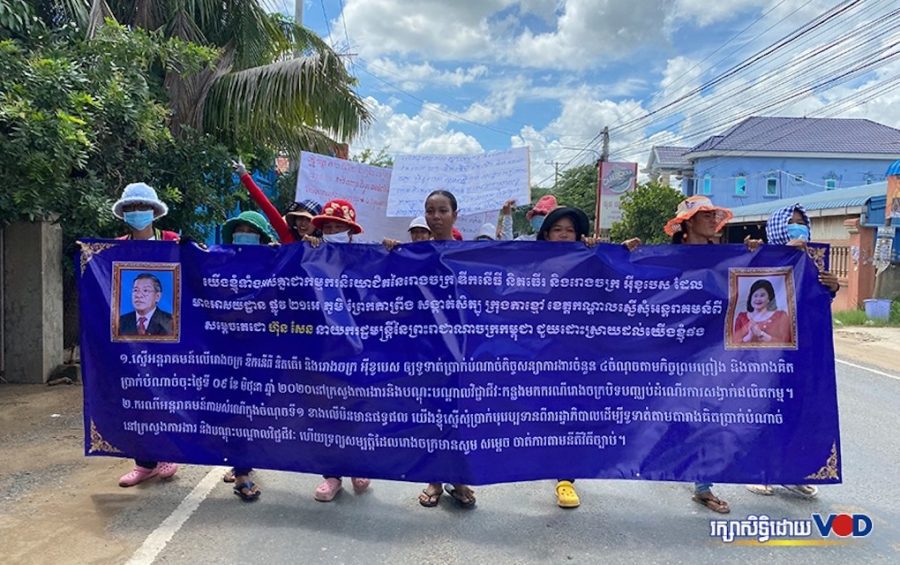The Kandal provincial governor on Monday vowed to find a solution for workers of the Dignity Knitter and Eco Base garment factories after hundreds of workers marched to Prime Minister Hun Sen’s Takhmao home to protest the factories’ failure to compensate out-of-work employees.
More than 500 workers participated in a march from the Dignity Knitter and Eco Base factories in Takhmao City’s Sitbou commune because the owner of the factories has not compensated workers for wages or benefits as agreed upon in a settlement after the factories’ closure in April.
The workers had intended to march from the factories and file petitions to the provincial court and then Hun Sen’s home on Monday, but they were stopped by authorities after traveling about 15 kilometers before reaching their intended destination.
Phin Sophea, a worker representative, said employees had originally asked the factory owner for more compensation in its settlement, which was reached earlier this year, but they lowered the amount they requested because the factories had struggled under the economic slowdown caused by Covid-19.
The garment sector, Cambodia’s largest employer, has lost more than 150,000 jobs, or about 15 percent of the industry’s labor force, and faced some 400 factory suspensions, with more factories and workers at “imminent risk,” the Garment Manufacturers Association in Cambodia (GMAC) said last week.
Sophea said the workers had filed an injunction order with the provincial court to prevent the factory from selling equipment without using the funds to compensate workers. However, another company, which Sophea said was a transportation company but did not have further information, had filed its own injunction to hold the equipment because the factories also owed the unnamed company money. This injunction conflicted with the workers’ court complaint, Sophea said.
“We march to Samdech Hun Sen’s house in order to ask for his intervention to end the labor dispute in these two factories because we have guarded in front of the factory day and night, and under the rain for more than six months already,” Sophea said on Monday.

Fearing factory management would sell the equipment under the cover of night, workers have spent shifts sleeping in front of the two factories, and Sophea said workers had continued the practice to date.
While marching workers were stalled by authorities for about 30 minutes at the Takhmao City riverside park, Kandal provincial governor Kong Sophoan visited them with government lawyers and prosecutors, claiming he would ensure the conflicting injunctions were cleared up.
“[I will] ask the labor department, government lawyers and the prosecutor who participated and helped in this case to do whatever procedures in order to cancel the injunction order of the [other] company and uphold the injunction order of the workers, and then submit [the workers’ injunction order] according to court procedures to put the factories’ equipment up for auction and settle for workers,” Sophoan told workers and reporters.
Seang Yout, a dispute resolution officer at the Coalition of Cambodian Apparel Workers Democratic Union, said the owner of the two factories owes 1,223 workers a total of more than $1.16 million, and the value of the factories’ equipment should be sufficient to compensate employees if the auction is done properly and transparently.
Yout said he believed the government should compensate workers immediately because they had still not been paid months after a settlement was reached.
“Because some workers do not have work to do and have no money to pay utilities, some workers were evicted from their rental houses,” Yout said. “So the government should release its money to settle with them first and settle [the compensation] with the factory later.”
Heng Sreymao, who worked at Dignity Knitter for 14 years, said her landlord was threatening to evict her from her rental room, as she had no income to pay the rent. She urged officials to resolve the dispute soon before hers and other workers’ situations worsened.
“The landlord said if I still don’t have money to pay them, they will get me out of their house because they said they have no ability to pay utilities for me,” Sreymao said.
The workers would march to the premier’s house again if the governor did not find a solution as promised, she added.
(Translated and edited from the original article on VOD Khmer)













